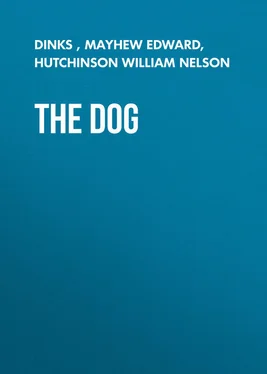Array Dinks - The Dog
Здесь есть возможность читать онлайн «Array Dinks - The Dog» — ознакомительный отрывок электронной книги совершенно бесплатно, а после прочтения отрывка купить полную версию. В некоторых случаях можно слушать аудио, скачать через торрент в формате fb2 и присутствует краткое содержание. Жанр: Домашние животные, foreign_antique, foreign_prose, на английском языке. Описание произведения, (предисловие) а так же отзывы посетителей доступны на портале библиотеки ЛибКат.
- Название:The Dog
- Автор:
- Жанр:
- Год:неизвестен
- ISBN:нет данных
- Рейтинг книги:5 / 5. Голосов: 1
-
Избранное:Добавить в избранное
- Отзывы:
-
Ваша оценка:
- 100
- 1
- 2
- 3
- 4
- 5
The Dog: краткое содержание, описание и аннотация
Предлагаем к чтению аннотацию, описание, краткое содержание или предисловие (зависит от того, что написал сам автор книги «The Dog»). Если вы не нашли необходимую информацию о книге — напишите в комментариях, мы постараемся отыскать её.
The Dog — читать онлайн ознакомительный отрывок
Ниже представлен текст книги, разбитый по страницам. Система сохранения места последней прочитанной страницы, позволяет с удобством читать онлайн бесплатно книгу «The Dog», без необходимости каждый раз заново искать на чём Вы остановились. Поставьте закладку, и сможете в любой момент перейти на страницу, на которой закончили чтение.
Интервал:
Закладка:
Happily, however, the majority of pretended cures are harmless. A roll of sulphur in the animal's water may be permitted, since it amuses the proprietor while it does not injure his dog. Some of these domestic recipes, nevertheless, are far from harmless, and they are the more to be deprecated, because those which most people would imagine to be safe are the very ones which are attended with the greatest danger. Common salt is a poison to the dog; tobacco is the source of many a death in the kennel; castor oil often does the ill which months of care are needed to efface, even if the life be not destroyed. In the majority of cases vomits are far from beneficial; bleeding is very seldom required, and the warm bath has sealed the doom of innumerable animals.
The foregoing observations will have informed the reader of the reasons that prompt the publication of the present work, which is put forth only as a step towards the point the author does not yet pretend to have fully attained. The study of years will be required to perfect that which is now commenced, and further experience will probably demand the retraction of many of the opinions herein advanced. The reader will understand, the author in the present work asserts only that which he now believes. It must not be imagined, however positive may read the language in which his sentiments are expressed, that the writer is pledged to uphold any of the conclusions at which he may have arrived; knowledge is in its nature progressive, and canine pathology is not yet clearly made out. The advantages which accompany the study of anatomy, physiology, and therapeutics have yet to be more largely applied to the diseases of the dog, and until this has been accomplished, science, not reposing upon truth, will be constantly subjected to change. The present work, therefore, will be accepted only as a contribution to veterinary literature, and its contents will be viewed as doing nothing more than declaring the temporary convictions of one, who, desirous of truth, does not conceal that his mind is oppressed by many doubts.
In the following pages advantage will be freely taken of the labours of those authors who have written upon the subject; nor must it be supposed, because the writer may feel himself obliged to dissent from, he therefore undervalues the genius of Blaine or Youatt. Before Blaine collected and arranged the knowledge which existed concerning the diseases of the dog, canine pathology, as a separate or distinct branch of veterinary science, hardly existed. The task he accomplished; but if after the lapse of years some of his opinions are found to be unsound, and some of his statements discovered to require correction, these circumstances may be regarded as the natural consequences of progression, while they in no way deteriorate from the honor due to his name. Youatt enlarged and softened the teaching of his master, and by the liberality of his communications, and the gentleness of his example, improved and adorned the science to which he was attached. To others than these two great men I have no obligations to acknowledge. For their memories I take the opportunity of expressing the highest respect, and confess that to their instruction is fairly due any novelty which the present pages may contain; since but for those advantages their teaching afforded, it is more than doubtful if I had perceived the facts herein made known.
Before any mention is made of the diseases of the dog, it will be proper to take some notice of the temperament of the animal, as without regarding this the best selected medicines, or the most assiduous attention, may be of no avail. Any one who will observe the animal will soon be made aware of its excessive irritability. The nervous system in this creature is largely developed, and, exerting an influence over all its actions, gives character to the beast. The brain of the dog is seldom in repose, for even when asleep the twitching of the legs and the suppressed sounds which it emits inform us that it is dreaming. No animal is more actuated by the power of imagination. Who is there that has not seen the dog mistake objects during the dusk of the evening? Delirium usually precedes its death, and nervous excitability is the common accompaniment of most of its disorders. To diseases of a cerebral or spinal character it is more liable than is any other domesticated animal. Its very bark is symbolical of its temperament, and its mode of attack energetically declares the excitability of its nature. The most fearful of all the diseases to which it is exposed (rabies), is essentially of a nervous character, and there are few of its disorders which do not terminate with symptoms indicative of cranial disturbance. This tendency to cerebral affections will, if properly considered, suggest those casual and appropriate acts which the dog in affliction may require, and which it would be impossible for any author fully to describe. Gentleness should at all times be practised; but to be truly gentle the reader must understand it is imperative to be firm. Hesitation, to an irritable being, is, or soon becomes, positive torture.
He who would attend upon the dog must be able to command his feeling, and, whatever fear he may be conscious of, he must have power to conceal his emotion. The hand slowly and cautiously advanced, to be hastily retracted, is nearly certain to be bitten. Whatever therefore is attempted should be done with at least the appearance of confidence, and the determination of the man will, in the generality of cases, check the disposition of the beast. There should be no wrestling or fighting. The practitioner should so prepare his acts as to prevent the dog in the first instance from effectually resisting, and the animal mastered at the commencement is usually afterwards submissive. If, however, from any cause, the primary attempt should not be effective, the attendant, rather than provoke a contest which can be productive of no beneficial result, should for a brief period retire, and after a little time he may with better success renew his purpose.
Strange dogs are not easily examined in their own homes, especially if they be favorites and their indulgent owners are present. Like spoiled children, the beasts seem to be aware of all the advantages which the affections of their master give to their humors. They will assume so much, and play such antics, as renders it impossible to arrive at any just conclusion as to the actual state of their health. Dogs in fact are great impostors, and he who has had much to do with them soon learns how cunningly the pampered "toy" of the drawing-room can "sham." For deception, consequently, it is necessary to be prepared, and practice quickly teaches us to distinguish between what is real and that which is assumed. The exertion, however, required to feign disturbs the system, and the struggle which always accompanies the act renders it frequently impossible to make the necessary observation with requisite nicety. Petted dogs are, therefore, best examined away from their homes, and in the absence of any one who has been in the habit of caressing them. Frequently I have found it of no avail to attempt the examination of these creatures at the residences of their owners; but the same animals brought to my surgery have, without a struggle, allowed me to take what liberties I pleased. I usually carry such dogs into a room by myself, and commence by quickly but gently lifting them off their legs and throwing them upon their backs. This appears to take the creatures by surprise, and a little assurance soon allays any fear which the action may have excited. The dog seldom after resists, but permits itself to be freely handled. Should, however, any disposition to bite be exhibited, the hand ought immediately to grasp the throat, nor should the hold be relinquished until the creature is fully convinced of the inutility of its malice, and thoroughly assured that no injury is intended towards it. A few kind words, and the absence of anything approaching to severity, will generally accomplish the latter object in a short period, and confidence being gained, the brute seldom violates the contract.
Читать дальшеИнтервал:
Закладка:
Похожие книги на «The Dog»
Представляем Вашему вниманию похожие книги на «The Dog» списком для выбора. Мы отобрали схожую по названию и смыслу литературу в надежде предоставить читателям больше вариантов отыскать новые, интересные, ещё непрочитанные произведения.
Обсуждение, отзывы о книге «The Dog» и просто собственные мнения читателей. Оставьте ваши комментарии, напишите, что Вы думаете о произведении, его смысле или главных героях. Укажите что конкретно понравилось, а что нет, и почему Вы так считаете.











